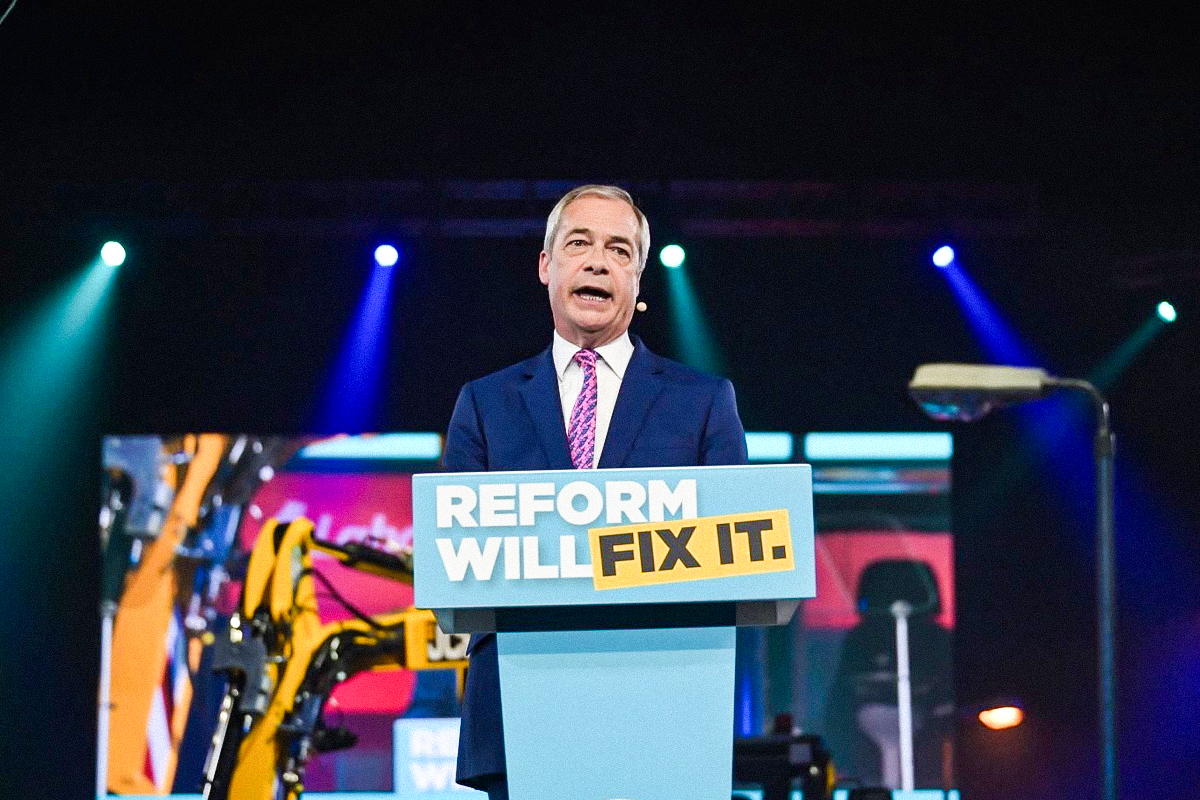Even at the best of times, any election can only provide a snapshot – and local elections are even more partial in the picture they provide. Furthermore, the results of yesterday’s votes are still coming in.
Nevertheless, the general trajectory and tendency is clear. Britain’s political landscape is being transformed before our eyes.
Decades of decay and years of austerity have led to a burning hatred towards the entire establishment. Politically, this expresses itself as a rejection of Britain’s two main parties – the Tories and Labour – and in the rise of Reform.
The old two-party system that has dominated Westminster for the past century is fracturing, under the hammer blow of events. As Nigel Farage himself correctly asserted, commenting on Reform’s latest electoral successes, we are seeing “a whole different politics”.
Britain is entering uncharted waters. Instability reigns at every level: economically, socially, and politically. A new chaotic and uncertain chapter is opening up in front of us.
Views of politicians went beyond healthy cynicism ranging from them not getting it to being useless to being actively corrupt. This wasn’t a partisan thing, it applied to everyone Tory, Labour, Lib Dem, Reform, being part of the political class was more telling than party. pic.twitter.com/9BOQ6D5Kke
— Luke Tryl (@LukeTryl) April 28, 2025
Farage’s clean sweep
The Conservative-Labour duopoly is on course for a hammering in this year’s local elections, with both parties losing votes everywhere, in all directions. Reform, meanwhile, is set for a relative clean sweep of victories.
Already, Starmer’s Labour have been humiliated in the constituency of Runcorn & Helsby. On the basis of a 17 percentage point swing, Farage’s Reform overturned an almost 15,000 Labour majority in this bellwether by-election, winning the seat by a super-slim margin of just six votes.
In Greater Lincolnshire, meanwhile, ex-Tory MP Andrea Jenkyns comprehensively defeated her former party, by 42 percent to 26 percent, providing Reform with its first mayoral position.
At the time of writing, Reform UK is hopeful of picking up another mayoralty in Hull & East Yorkshire. And it came a close second in Doncaster, North Tyneside, and West of England, giving Labour a scare in all three contests.
Farage’s party has also grabbed hundreds of council seats off of the Tories and Labour, with a drip-feed of further local authority victories likely to be announced for Reform in the hours ahead.
Alarm bells
This has set off alarm bells at Labour and Tory HQs.
For the Conservatives, Reform poses an existential threat. As Farage himself accurately summarised this morning, these electoral results “send a message across much of the country that we are now the opposition to the Labour Party in government”.
For Labour, meanwhile, the Runcorn by-election shows the potential for Reform to turn the so-called ‘red wall’ into a ‘turquoise wall’. After all, by some measures, the Cheshire constituency had been Labour’s 16th safest parliamentary seat.
If the Runcorn swing towards Reform was replicated across the country, more than 250 Labour MPs would lose their positions. Hence the anxiety and panic spreading through Starmer’s party.
Much could happen between now and the next general election. And precise predictions are impossible, given the volatility inherent in the situation, as votes splinter across four or five Westminster parties.
But it is still notable that recent surveys put Reform out in front in terms of public support. Some even suggest that Farage could gain a majority in the House of Commons, reducing Labour and the Tories to a rump.
🚨 NEW | Poll suggests **Labour wipeout**
🟣 REF: 28% (-)
🔵 CON: 20% (-)
🔴 LAB: 20% (-2)
🟠 LD: 14% (-)
🟢 GRN: 13% (+3)Via @FindoutnowUK , 23 Apr (+/- vs 16 Apr) pic.twitter.com/ldP9EA9795
— Stats for Lefties 🍉🏳️⚧️ (@LeftieStats) April 24, 2025
Importantly, Reform’s lead is only likely to increase, as momentum gathers behind Farage’s party, and as Starmer’s Labour further discredits itself by carrying out further austerity and attacks on the working class.
No matter what the exact outcome, it is clear that the centre ground has well-and-truly collapsed. The period ahead will be one of increasing political fragmentation, polarisation, and radicalisation. The old status quo is crumbling.
Outflanking Reform
Reform’s success is already leading to frictions and fissures inside Labour.
The party’s leaders are veering about empirically, bouncing from pillar to post as they attempt to respond to each new crisis. But their efforts are futile, like a game of whack-a-mole.
As Robert Shrimsley of the Financial Times comments, by running around trying to put out fires, Keir Starmer and his cronies are “in danger of satisfying no one by trying to placate everyone”.
Those closest to Starmer are calling for Labour to tack even further to the right, in an effort to prevent a haemorrhage of support towards Reform. But this strategy has already been attempted, to no avail.
Labour’s candidate in Runcorn made migrant-bashing a central part of her programme. Yet such attempts to outflank Reform on the right proved to be a failure.
Primarily, this is because such efforts fail to understand the real reason why certain working-class voters are moving towards Reform.
Disaffected workers are backing Farage not simply because of his party’s stance over immigration, but because of his opportunistic opposition to cuts and industrial closures – for example, in relation to winter fuel payments and British Steel.
Unfortunately, there are many on the left who make the same mistake – believing that Reform’s surge fundamentally represents support for racist ideas – but from the opposite standpoint.
This has led to irresponsible ‘left’ leaders hysterically banging the drum about the ‘threat of the far right’, and running liberal popular-front campaigns to ‘stop Farage’.
🚨Reform have gained another MP in Runcorn by a handful of votes. This confirms their threat in British politics. It’s time to get organised to stop Reform UK#StandUpToRacism pic.twitter.com/N9fnb7zPza
— Stand Up To Racism (@AntiRacismDay) May 2, 2025
No doubt many have sincere concerns about the danger of reaction – especially given the barbarism that was seen on Britain’s streets last summer, as fascist gangs marauded through Muslim and ethnic minority communities.
The solution, however, is not to rally behind any so-called ‘lesser evil’, or to fight the right on the terrain of culture-war questions, but to struggle on an independent class basis for bold socialist policies.
In the final analysis, the rise of Reform is due to the complete political vacuum in Britain, with the ‘left’ failing to provide a genuine anti-establishment alternative to Starmer’s Labour and the Tories.
In the absence of a clear class option, the field has been left wide open for reactionary populists and charlatans like Farage to mop up.
Diktats of capital
Others within the labour movement have started to grasp why Farage is gaining in popularity amongst some layers of workers: because of his demagogic diatribes about ‘broken Britain’.
“By continuing austerity, pandering to the far right, and failing to offer real change,” states left-wing grouping Momentum, for example, “the Labour Leadership risks handing the country to the likes of Nigel Farage.”
Similarly, veteran left MP Diane Abbott noted on social media that the “Labour leadership seems to think that the answer to these catastrophic election results is more of the same, including cuts to winter fuel payments”.
“The Labour leadership should be listening to voters on winter fuel payments, welfare cuts, the cost of living, the NHS and energy bills,” Abbott implored. “Instead, it is attacking our own voters.”
But such appeals to Starmer and co. will fall on deaf ears. The Labour leaders have proven that they take their marching orders from the bankers and billionaires; from the diktats of capital, not from ordinary workers or party members.
And with British capitalism in a dire state – dilapidated, stagnant, and stumbling from one disaster to the next – this means that savage cuts are the only item on the menu.
Revolutionary road
The reality is that any government that operates within the confines of capitalism will be ridden with crises and beholden to an austerity agenda.
Despite the reformist assertions of certain ‘lefts’, austerity is not a ‘political choice’, but a product of the cold logic of capitalism in crisis.
As the capitalist system spasms globally, the pressures bearing down on Starmer’s government will only intensify.
This will provoke social explosions and bitter class battles. The militant struggle currently being waged by the Birmingham bin workers is the music of the future.
The failure and inability of successive capitalist governments – Tory, Labour, and Reform – to offer a way forward will lead ever-larger layers to draw radical, and even revolutionary, conclusions.
It is the task of communists today to patiently explain; to provide a lucid understanding and sober perspective regarding the road ahead; and to build a force that can connect with the anti-establishment anger amongst workers and youth – and channel these moods and sentiments in a revolutionary direction.






